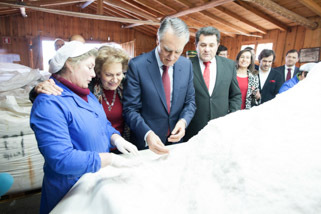
 |
|
The Globalisation Council, an initiative promoted by myself a year ago, is now having a new meeting in Sintra. In this council, foreign and Portuguese entrepreneurial leaders will debate the actual challenges, think over the global economy risks and opportunities, and share their experiences. This is the main purpose of the meeting.
The recent financial markets crisis is a clear alert: globalisation requires that all the players must have a deeper and stronger knowledge of the global economy. The growing economic interdependence and integration, regionally or market level speaking, establishes that enterprises must embrace a strategic approach regarding their business and competences, making them more capable of knowing and controlling the risks - taking advantages of the opportunities that arise in the world competition arena. The ones choosing another way will probably place themselves in a vulnerable position. Globalisation is not a neutral challenge that can be ignored.
Globalisation, by means of the progressive market integration and economic opening, is favouring a better global affectation of the resources through a faster and more efficient capital, knowledge and skills mobilisation. So, this can be clearly translated into a stronger economic growth. Globalisation benefits are not exclusive of big and richer countries. Economy dimension and geographic location do not restraint the global economy opportunities access.
It is also certain that globalisation can be responsible for new risks and new economic and social asymmetries that we must not ignore. As we know, globalisation exposes enterprises to a more aggressive and demanding competition framework. But also requires a permanent adaptation capacity to the evolution of international competition conditions.
In a world that is now facing a bigger economic integration, competitiveness depends on its capacity to take advantage of enterprises and economies interdependence and complementarity. Nowadays, to explore new growth opportunities in the international markets is an avoidable option and sometimes a question of survival for a growing number of business sectors and Portuguese enterprises.
However, the global challenge is linked to three keywords: innovation, competence and flexibility.
Permanent innovation must be compulsory for all companies. Scientific progress and technological innovation, applied in new business models, are moving fast, with no interruptions. New companies, especially those from the emerging economies, are shaking the productive structures and competition standards belonging to the past. Companies that will stay close to the same old production techniques, organisation and management methods, as well as ancient commercial practices are, inexorably, compromising their competitive levels. Innovation must be a compulsory word for all companies aiming to succeed in global markets.
To innovate and to compete globally also requires competence, that is to say, capacity and skills to produce, to provide services and to optimise resources. But also demands a systematic control of markets, techniques, methods and competitive models. Without competence there is no sustained competitivity.
Flexibility is another keyword, and must translate the response capacity to market evolution and competitive aspects of the competition context itself. In the globalisation era, the entrepreneurial response capacity can, very often, make a difference in what concerns the success achievement.
However, economic growth and efficiency purposes can not make us deviate from other crucial aims: equality of opportunities and social cohesion. As I said, economic growth based on social destruction is not acceptable. Equality of opportunities regarding the access to the global economy extraordinary benefits is another imperative that must guide all States, regions and multilateral instances.
Globalisation must not be an alibi used to free from responsibility those who must grant the conditions that assure not only a loyal and disciplined competition but a high level of social and economic cohesion, protecting the less favoured and the most vulnerable segments and promoting the global access to education, to new technologies and to the information society. That’s why public politics quality, international cooperation and multilateral regulation must be improved.
Integration can not and must not be synonymous of uniformization. Diversity is one of the most valuable assets of global economy. Our world reflects a wealthy mosaic of differences, which value must be respected and integrated. More than work in the same way, globalisation means working together, cooperation, and network. As a matter a fact, many companies are now using global scale resources taking advantage of difference synergies.
This is the main subject of the present council but always keeping in mind the starting idea: Think Global, Act Global.
I’m sure that a careful thought on the experiences performed by the entrepreneurial leaders from several regions and cultures of the world will contribute to improve our understanding of all the issues that presently glows in this stage of the globalisation and to find the best way to manage all the challenges of this century.
And I’m also convinced that the President of the Republic must encourage Portuguese companies and their leaders to embrace a strategic reflection regarding the new international competition framework. I’m sure that at the end of this meeting we’ll be able to see stronger bonds between Portuguese managers and businessmen and their foreign counterparts. I also expect that this council could be an inspiration for all the participants.
I’ve recently inaugurated an exhibition in the United States called “Encompassing the Globe”, which notably illustrates Portugal’s universal vocation. I think this is a successful title for it, and for us, the challenge is vital and permanent.
Aníbal Cavaco Silva
© 2006-2016 Presidency of the Portuguese Republic
You have gained access to the records of the Official Site of the Presidency of the Republic from 9 March 2006 to 9 March 2016.
The contents available here were entered in the site during the 10 year period covering the two mandates of President of the Republic Aníbal Cavaco Silva.